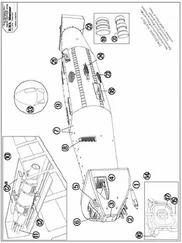I rouse from Low-Level Autonomous Stand-By to Normal Readiness for my regularly scheduled update. Awareness spreads through me, and I devote 0.0347 seconds to standard diagnostic checks. All systems report nominal, but I detect an anomaly in Number Twenty-One Bogie in my aft outboard port tread and activate a depot sensor to scan my suspension. A parikha, one of the creatures the colonists of Santa Cruz erroneously call “birds,” has built its nest in the upper angle of the bogie wheel torsion arm. This indicates that the depot’s environmental integrity has been breached, and I command the central computer to execute an examination of all access points.
The depot computer net lacks my own awareness, but it is an efficient system within its limitations and locates the environmental breach in 3.0062 seconds. Maintenance and Repair’s Number Seventy-Three Ventilator’s cover has been forced open by an intruding cable-vine, thus permitting the parikha to gain access. I command the depot computer to dispatch auto mechs to repair the hatch cover. A further 0.000004 seconds of analysis suggests to me that the possibility of such an occurrence should have been allowed for in the depot computer’s original programming, and I devote 0.0035 seconds to the creation of fresh execution files to establish continuous monitoring of all depot access points and to enable automatic repair responses in the event of future failures in integrity.
These actions have consumed 3.044404 seconds since resumption of Normal Alert Readiness, and I return to my initial examination of the parikha nest. Its presence constitutes no impediment to combat efficiency, yet the sensor detects live young in the nest. I devote an additional 0.0072 seconds to consideration of alternatives, then command the depot computer’s remotes to remove the nest and transfer it to an exterior position of safety near the repaired ventilator cover. I receipt the depot computer’s acknowledgment of my instructions and turn to a second phase Situation Update.
My internal chrono confirms that 49 years, 8 months, 3 days, 21 hours, 17 minutes, and 14.6 seconds, Standard Reckoning, have now elapsed since my Commander ordered me to assume Low-Level Autonomous Stand-By to await her replacement. This is an unacceptable period for a unit of the Line to remain in active duty status without human supervision, and I check the depot com files once more. No updated SitRep or other message to explain the delay has been receipted during my time at Stand-By, and I allocate another 4.062 seconds to consideration of possible explanations. Despite this extensive analysis, I remain unable to extrapolate the reason for the delay with certainty, yet I compute a probability of 87.632 percent that my Commander was correct in her observation that Sector HQ considers my planet of assignment “the backside of nowhere in particular.”
Whatever its reasons, Sector HQ clearly has attached no urgency to detailing a new Commander. This conclusion is disturbing, and I allocate an additional 2.007 seconds to deliberation of potential responses on my part. My Autonomous Decision Protocols grant me the discretion to break com silence and dispatch an interrogative signal to Sector Central in conditions of Priority Four or greater urgency, yet my analysis of satellite data and commercial com traffic to and from Santa Cruz reveals no indication of current or near-future threats to my assigned station. Absent such threats, I must grudgingly concede that there is, in fact, no overriding urgency in the arrival of my new Commander.
I make a note in my active memory files to reconsider this decision yet again during my next scheduled Normal Alert period and revert to Autonomous Stand-By.
Lorenco Esteban stepped out of his office into the humid oven of a Santa Cruz summer afternoon and scratched his head as a tiny spacecraft slid down towards Santa Cruz’s weed-grown landing apron. The immense plain of ceramacrete stretched away in all directions, vast enough to handle even the largest Navy cargo shuttle, but it was occupied only by a single dilapidated tramp freighter in the livery of the Sternenwelt Line. The tramp was already cleared for departure with a full cargo of wine-melons, and given her purser’s persistent-and irritating-efforts to negotiate some sort of real estate deal, Esteban was heartily ready for her to clear the field. Not that she was placing any strain on Santa Cruz’s basing facilities.
No one was quite certain why Santa Cruz had been given such a large field in the first place. It dated from the First Quern War, and conventional wisdom held that the Navy had planned to use Santa Cruz as a staging area against the Quern. That was only a guess, of course, though it made sense, given the Santa Cruz System’s spatial location.
If the Navy had so intended, its plans had fallen through, yet the incongruously enormous field remained, though only a fraction of it was used with any sort of regularity. Ciudad Bolivar, Santa Cruz’s capital and only real city, lay fifteen kilometers to the northwest, just outside the old Navy Reservation. The area to the immediate northeast was a vast expanse of melon fields-most of which belonged to Esteban himself-and few people visited the field under normal circumstances. Despite the Sternenwelt officer’s efforts to buy up crop land, there was little about the sleepy farming planet to attract even casual commerce. Wine-melons brought a decent price, but only a decent one, and no official presence had ever shown even a passing interest in Esteban’s homeworld. Until today, at least, he thought, and scratched his head harder as he recognized the Concordiat Navy insignia on the incoming shuttle’s nose.
It looked like one of the new Skyhawk three-man shuttles, though he couldn’t be certain. He’d never actually seen one, only read about them in the periodic updates the Navy still sent to the attention of “CO FLT BASE SANCRUZ.” In his own mind, Esteban was positive the computers on the other end of those updates had no idea who the current “Commanding Officer, Fleet Base Santa Cruz” was. He hoped they didn’t, anyway. The probability that Concordiat officialdom had simply forgotten Santa Cruz’s existence was much less disturbing than the possibility that the Navy considered a farmer with no military background and who’d never been off-planet in his entire seventy years a suitable CO for anything, much less a “fleet base.”
Now he watched the Skyhawk (if that was what it was) deploy its landing legs and settle gracefully onto them. From what he’d read of the Skyhawks, they were hyper-capable for short hops-no more than forty or fifty light-years-and that made a certain degree of sense. The shuttle could have made the run from Ursula, the sector capital, under its own power without diverting a regular vessel from some useful duty. Of course, that left the question of just why the Navy would go to the bother of sending anyone to Santa Cruz in the first place.
The hatch popped, and Esteban ambled over as a trim, wiry man in an immaculate uniform swung down the hull handholds. Esteban couldn’t place the uniform, though something about it tugged at the back of his memory, and he paused with his hands in his pockets as the newcomer jumped the last meter and a half to the ceramacrete and stood looking about him.
“Morning, stranger.”
The uniformed man turned at the greeting. He said nothing, but Esteban took his hands from his pockets when those cold, grey eyes met his. It wasn’t anything the stranger did. There was just something about those eyes, as if they’d seen too much, done too much, that sent a faint and formless chill down Esteban’s spine. The stranger’s gaze held his for a moment, and then the mouth below those eyes smiled pleasantly.
Читать дальше












